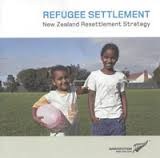National Refugee Resettlement Forum

E nga mana, e nga reo, e nga iwi o nga hau e wha e huihui nei, tēnei aku mihi māhana ki a koutou. Kia ora tātou katoa. Distinguished guests, ladies and gentlemen, I extend my warm greetings to you all.
I specifically acknowledge Thomas Albrecht, Regional representative for the United Nations High Commissioner for Refugees; Joe Appiah and Keiko Foster, of the International Organisation for Migration; Mr David Smol, Chief Executive of the Ministry of Business, Innovation and Employment; and Nigel Bickle, Deputy Chief Executive Immigration - tēnā koutou katoa.
Thank you for inviting me along to this event and the opportunity to share some time with people who are working on a pressing concern to all of us – the resettlement of refugees in New Zealand.
In this year of significant anniversaries of events that have helped shape this country – the 175th anniversary of the signing of the Treaty of Waitangi and the centenary of the Gallipoli landings – we have reflected on what our nation stands for, and the good fortune we have to be its citizens. At the same time, we have also considered the plight of people whose nations have failed them, people who’ve been displaced by war or political turmoil, and whose only hope is to seek refuge elsewhere.
Each day we are reminded of the plight of millions of people who live their lives in limbo, with inadequate food, shelter, sanitation or safety.
We see distressing images of desperate people crammed in flimsy boats seeking respite. These images remind us that there is a vexing people problem. The latest UN estimates; of around 50 million refugees, asylum seekers and stateless and displaced people around the world; is a stark statistic.
In New Zealand we have long acknowledged the plight of refugees. Even before we had reason because of international obligations to provide refuge, New Zealand has welcomed refugees. Successive governments have reflected the convictions of their citizens’ innate commitment to fair play, justice and political freedom. And the concept of seeking refuge resonates with our history of immigration, and people who have come here in search of a better life.
For those fortunate to come to New Zealand whether through our quota, or otherwise, we are obliged to support them beyond their initial resettlement. We need to do that so that they have the opportunities and means to participate fully as members of our communities.
We need to be sure that the enthusiasm of refugees to come to New Zealand is matched by an enthusiasm in our communities to benefit from their qualifications, talents and potential.
The whole-of-government approach being taken to refugee resettlement in New Zealand is commendable. Equally, I applaud the commitment of government and non-government agencies and refugee communities, represented tonight, for taking this opportunity to determine what works and what needs to be changed to make our resettlement process better.
New Zealand is a nation of immigrants. It has been a place of new beginnings for us all. I am reminded of this when I meet ex-refugees at Citizenship ceremonies and I see their optimism and energy, their dignity, their devotion to their families, their determination to succeed – and their joy at becoming part of our New Zealand family.
When I conduct investiture ceremonies, I meet individuals who make extraordinary contributions. This includes people like Mrs Wanda Ellis, who came here as one of the Polish orphan refugees in the 1940s. Wanda has spent her life assisting her Polish compatriots who have come to live here. She continues to be a pillar of her community and it was a delight to see her recognised with a QSM.
On Race Relations Day this year, I was inspired by members of the refugee communities I met at a reception we held at Government House in Auckland. I was most impressed by a young man, Mohamud Mohamud, who addressed the reception. Mohamud told of how his life had been transformed by the opportunities presented to him here. He talked about his academic achievements; and about his confidence that he would be able to fulfil his aspirations for the future.
The late Nelson Mandela once said, “The time is always ripe to do right”. The programme for this Forum will no doubt provide insights and suggest new avenues for investigation to do what is right. My hope is that, through the work you are all doing, we can build on our commitment to do right for our refugees and New Zealand. Refugees deserve lives of dignity, hope, achievement and belonging. New Zealand and New Zealanders can only benefit from the economic, social and cultural contribution that refugees are so keen to make.
I wish you all the best for the remaining day of the forum and for continuing progress in our efforts on behalf of our refugee population.
Kia ora huihui tātou katoa
